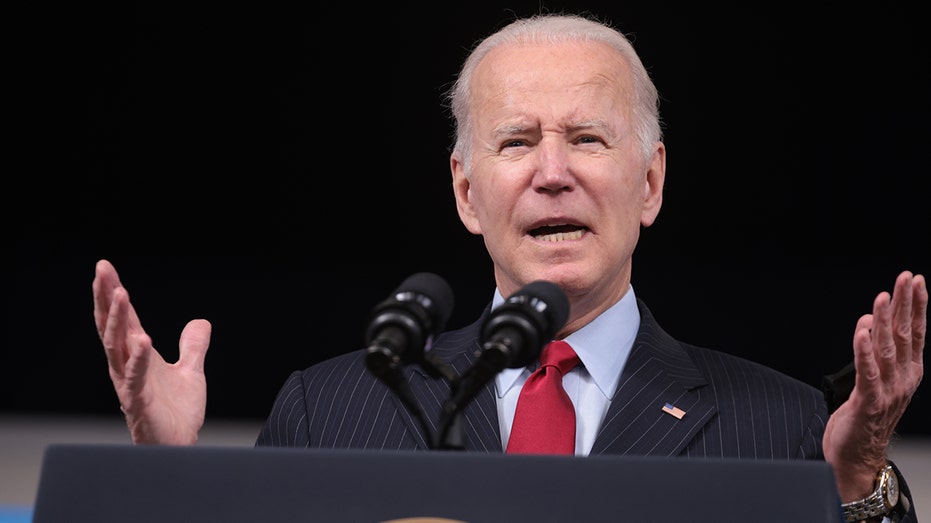Biden considers tapping emergency diesel reserve with prices near record high
White House: Tapping diesel reserve may not reduce prices, but could help to prevent spot outages
Gas, diesel prices putting ‘huge burden’ on farmers, everyday households: Gov. Pete Ricketts
Nebraska Governor Pete Ricketts discusses inflation and energy prices.
The Biden administration is preparing to tap a rarely used diesel reserve as the president faces mounting pressure to bring down fuel prices, which are hovering near a record high, a senior White House official told FOX Business.
White House officials have readied an emergency declaration that would allow President Biden to release diesel from the Northeast Home Heating Oil Reserve in order to deal with short-term supply shortfalls if conditions further deteriorate. CNN first reported the news.
INFLATION SOARS 8.3% IN APRIL, HOVERING NEAR 40-YEAR HIGH
The price of diesel – the fuel used by most farmers and shippers – has surged nearly 75% over the past year, with the national average cost hitting $5.54 on Monday, according to AAA. That's up from $3.17 just one year ago and is near the record high of $5.56 recorded one week ago.
Prices are even steeper in the Northeast region because it has fewer refineries than the rest of the country: In New York, for instance, prices are as high as $6.51 per gallon – a stunning 102% increase from one year ago.

President Joe Biden speaks on the economy in the Eisenhower Executive Office Building in Washington on Nov. 23, 2021. (Oliver Contreras/Bloomberg via Getty Images / Getty Images)
The sky-high fuel prices have roots in the faster-than-expected economic recovery from the pandemic, which has triggered the hottest inflation in decades as a result of strong consumer demand, trillions in government stimulus and disruptions in the global supply chain. The Russian war in Ukraine has also magnified the problem: Diesel inventories in the Northeast have plunged to record lows in recent weeks in part because of the conflict.
Distillate fuel inventories have plunged and are about 23% below the five-year average for this time of year, according to a recent Energy Information Administration report. Nationwide, distillate inventories, which include diesel, fell to their lowest level since 2008, while the East Coast has seen storage fall to the lowest level on record.
Alarmed by the drop in inventories in the Northeast and rising prices, the Biden team started conducting internal briefings and consulted with fuel retailers, as well as leading refiners and truck-stop operators, to better understand the situation, the White House official said.
The Northeast Home Heating Oil Reserve, which was created in 2005, consists of about 1 million barrels of diesel, roughly a day's worth of supply in the region. The reserve has only been tapped once before, in the aftermath of Hurricane Sandy in 2012. The White House official said the Biden team understands tapping the reserve may not substantially reduce diesel prices, but could prevent spot outages that would be "highly disruptive to families and businesses."

The price of diesel fuel is shown at this Flying J Truck Stop in Pearl, Mississippi, April 20, 2022. (AP Photo/Rogelio V. Solis / AP Newsroom)
By comparison, the White House has already tapped the nation's stockpile of emergency oil, called the Strategic Petroleum Reserve, several times to help reduce rising energy prices. The reserve currently contains 420 million barrels of crude oil, even after the recent releases.
The rising cost of diesel is threatening to exacerbate already sky-high inflation for most goods and services at a time when Americans can ill afford it.
The Labor Department reported earlier this month that consumer prices soared 8.3% in April, close to a 40-year high and far faster than economists expected. It emphasized how strong inflationary pressures in the economy still are, despite hopes that consumer prices could peak soon.
GET FOX BUSINESS ON THE GO BY CLICKING HERE
Rising inflation is eating away at strong wage gains that American workers have seen in recent months: Real average hourly earnings decreased 0.1% in April from the previous month, as the inflation increase eroded the 0.3% total wage gain, according to the Labor Department. On an annual basis, real earnings actually dropped 2.6% in April.





















